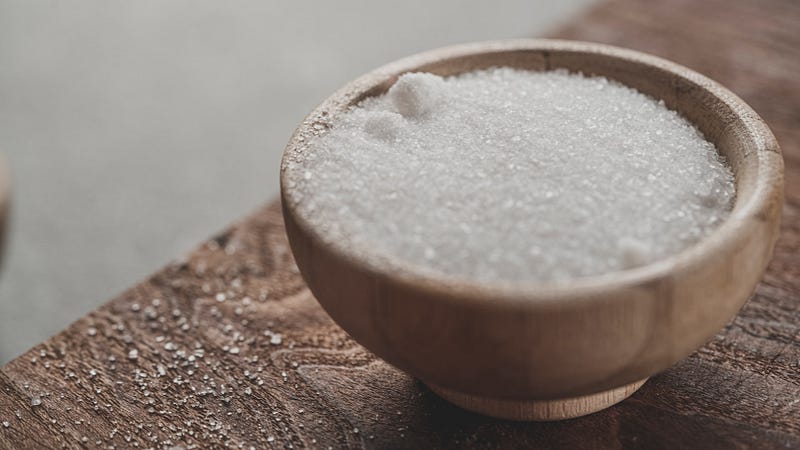Salt Substitute: A Simple Way to Extend Life for Hypertensive Patients
Written on
Understanding the Benefits of Salt Substitutes
The health risks associated with high sodium intake are well-documented, especially for individuals with hypertension. However, there's a simple yet effective way to enhance longevity without sacrificing flavor.
Many may associate health with stringent restrictions, but what if there was an easy approach to prolong life?
Most people evaluate their well-being based on taste; whether they prefer sweetness, spiciness, or saltiness, flavor plays a crucial role in their food choices. Nevertheless, it's vital to heed medical advice regarding sodium and sugar intake, particularly for those at risk of conditions like heart disease, stroke, and cancer.
Despite these warnings, many individuals resist altering their dietary habits. Statistics reveal that nearly 90% of Americans consume excessive salt, with 40% affected by hypertension. In non-Hispanic Black adults, this figure rises to 60%. This troubling trend indicates that a significant number of hypertension patients continue to jeopardize their health through their salt intake.
Fortunately, researchers have identified a potential solution that may help mitigate these health risks while preserving flavor.
Salt & Blood Pressure: How Shady Science Sold America a Lie - YouTube
In a study by the George Institute for Global Health in Sydney, Australia, substituting regular table salt with a potassium-enriched alternative—comprising 75% sodium chloride and 25% potassium chloride—was shown to significantly reduce the risk of premature death from conditions like stroke and heart disease. The findings indicated a reduction in stroke risk by 14%, cardiovascular events by 13%, and premature death by 12%.
Many might wonder if less salty food will lead them to add more seasoning. The advantage of potassium is that it offers a salty flavor profile, so you won't feel the need to over-season your meals. While potassium-based salt may have a slightly bitter taste, it generally does not detract from the enjoyment of your favorite dishes.
A blind clinical trial involving 100 participants aged 11 to 64 revealed that over 80% either could not differentiate between regular salt and the potassium-enriched variant or preferred the latter.
A separate study involving 21,000 volunteers in China highlighted significant positive changes after five years, particularly among participants with a history of hypertension and stroke.
Section 1.1: The Importance of Dietary Changes

The data shows that hypertension rates in China stand at 44.7% among adults aged 35 to 75. Given that these studies demonstrated remarkable benefits in a relatively short time, even more substantial outcomes could arise when this substitute is adopted by younger individuals over longer periods.
For the U.S. to realize these benefits, substantial changes in food production and regulatory practices are essential. Many Americans consume pre-packaged foods that often contain high levels of sodium.
The second crucial takeaway from the studies is the importance of preparing more meals at home, similar to dietary habits in China.
Section 1.2: The Impact on Stroke Risk
Research indicates that individuals with a systolic blood pressure of 140 mm Hg are three times more likely to experience a stroke compared to those with a reading of 120 mm Hg. Alarmingly, 98% of Americans do not meet the minimum potassium intake recommendation of 4,700 mg daily, primarily due to low consumption of plant-based foods.
Thus, incorporating a potassium-enriched salt substitute can significantly decrease stroke risk, particularly for those with high blood pressure.
Chapter 2: Health Risks and Precautions
Without Salt There's NO High Blood Pressure with Dr. C.E. Grim - YouTube
While potassium is generally safe, those with conditions like hyperkalemia should exercise caution. This disorder, characterized by elevated potassium levels due to kidney issues, can be exacerbated by certain medications and health conditions.
A study led by Dr. Bruce Neal indicated a marginal rise in deaths linked to hyperkalemia after the introduction of salt substitutes in diets. However, this figure pertains to the general population, and those at higher risk may face significantly increased mortality rates.
It's crucial to consult with a healthcare provider before introducing a potassium-enriched salt substitute into your diet, particularly for those with kidney disease or those on potassium-retaining medications.
Conclusion: A Path to Healthier Living
Switching from regular table salt to a potassium-enriched substitute can potentially save the lives of millions suffering from hypertension. However, this shift in dietary habits will only yield positive results if supported by regulatory changes in the food industry and an emphasis on home-cooked meals.
Despite its advantages, this salt substitute poses risks for individuals susceptible to hyperkalemia, kidney disease, or those on specific medications. Always seek medical advice before making such dietary changes.